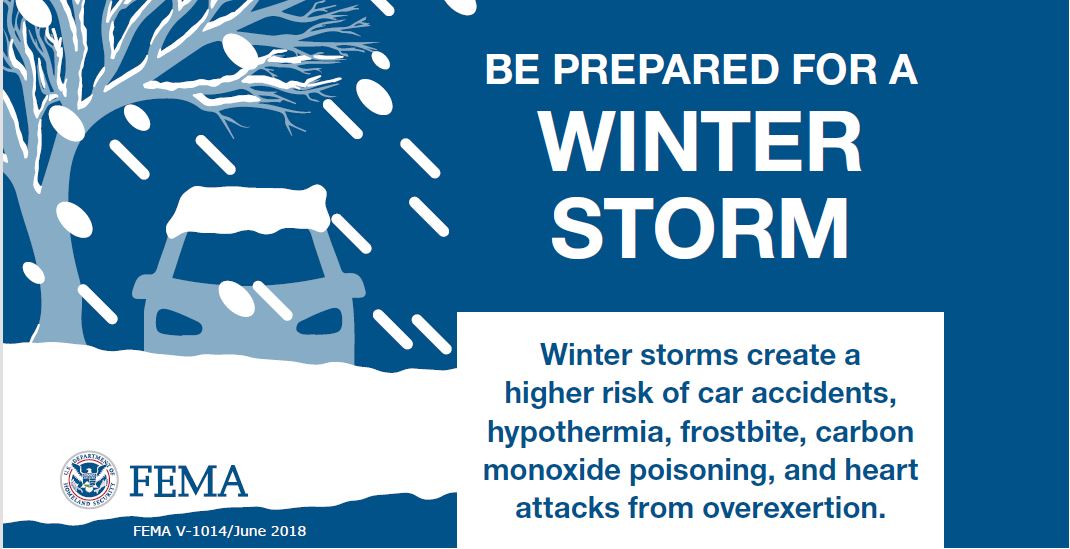Press Releases
Prepare for winter storms and power outages

ROSEBURG, OR – Are you prepared for winter storms and power outages?
As wintertime approaches, the City of Roseburg and Roseburg Fire Department encourage residents to take an active role in your own safety by preparing now and knowing how to respond if a storm or outage strikes.
Winter storms can bring extreme cold, freezing rain, snow, ice and high winds -- as well as power outages. Storms in the winter can increase the risk of car accidents, hypothermia, frostbite, heart attacks from overexertion, and carbon monoxide poisoning, according to the Federal Emergency Management Agency (FEMA). Seek shelter right away if the National Weather Service forecasts a winter storm warning for the area and stick to main roads if you must drive for any reason, such as seeking help, said Fire Chief Monte Bryan.
“It’s getting colder outside. The days are getting shorter,” Bryan said. “If you’re out traveling, have warm blankets, food and water, and plenty of gas.”
We often take our immediate, easy access to electrical power for granted and view power outages as brief, minor inconveniences. But electrical outages can quickly turn into real emergencies, so outages are as important to prepare for as fires, floods or any other emergency.
Extended outages that last days or weeks can impact the whole community and economy. Outages can sever home heating; disrupt communications, water and transportation; and possibly lead to closures of gas stations, grocery stores, ATMs, banks, retail businesses and other services. Some people may not be able to use medical devices. Food can spoil and water can become contaminated, according to FEMA.
“Stay warm and stay safe,” Bryan said.
Following are tips to help prepare for winter storms and the next power outage.
Basic Preparedness:
• Create a “Lights Out” box containing flashlights, spare batteries, manual can opener, first-aid kit and emergency radio for monitoring weather for your home;
• Store an emergency supply kit (warm clothes, blankets, flashlight, batteries, jumper cables, water, nonperishable snacks) in your car;
• Park your car away from large trees and keep the gas tank full;
• Sign up for local alerts and warning systems, and monitor weather reports;
• Take an inventory of items you need that rely on electricity;
• Prep your home for winter with insulation, caulking and weather stripping;
• Keep cellphone charged; during outage, switch to low power mode, turn off background apps and avoid using; keep a portable battery charger or recharge using car’s power plug;
• Store at least a two-week supply of non-perishable foods (canned soups, packaged meats, snacks), prescription medications and pet supplies;
• Store at least one gallon of bottled water per person per day;
• Talk to your doctor about a power outage plan for medical devices and refrigerated medicines.
Survive Winter Storms and Power Outages:
• Stay off roads during winter storms;
• Limit time outside and dress warmly in layers;
• Protect yourself against hypothermia and frostbite;
• Reduce heart attack risk and avoid overexertion when shoveling snow;
• Check on vulnerable neighbors;
• Have alternative methods of heating your home, other than with electrical appliances;
• If you must use candles and oil lamps, keep them away from pets and kids;
• Have working smoke detectors in your home and check them monthly;
• Keep fire extinguishers accessible and know how to use them;
• In extreme cold, go to a community location with power;
• Turn off or disconnect appliances and electronics to avoid damaging power spikes and surges;
Food Safety:
• Keep freezers and refrigerators closed;
• Use food supplies that don’t need refrigeration;
• If the power is out for less than two hours, the food in your refrigerator and freezer will be safe to consume, as long as the appliance door remains closed
• A freezer that is half full will hold food safely for up to 24 hours; a full freezer will hold food safely for 48 hours
• If you have a generator, you can run freezers for two hours each day to keep food safely frozen
• Refrigerated items such as milk and other dairy products, meat, fish, eggs, gravy, and spoilable leftovers can be packed in a cooler surrounded by ice or snow.
Carbon Monoxide:
• Never use generators, barbecue grills or gas-powered heaters indoors;
• Provide ventilation for indoor heaters;
• Know the symptoms of carbon monoxide poisoning;
• Have working carbon monoxide detectors in your home.
Posted by RoseburgAdmin